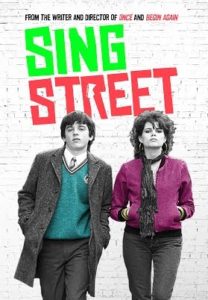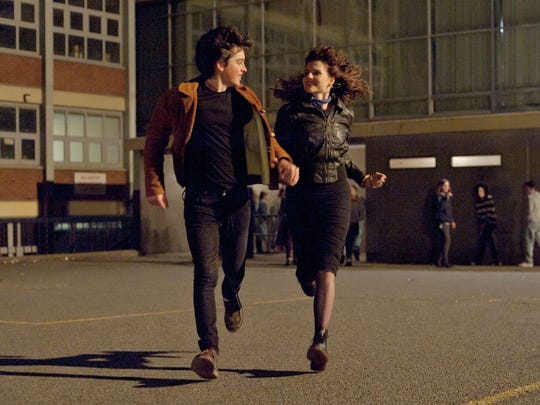Episode One — Sing Street
The My Celluloid Antidepressant series — which begins with Sing Street — has now taken on new meaning as we adjust to the new normal vocabulary of “shelter in place,” “self quarantine” and “pandemic.” There is no longer a need to be depressed, anxious, or have any other psychiatric condition to take advantage of this charming Irish film. Please read my little ditty, and stay safe, sane, healthy (not necessarily in that order).

During a key moment in the offensively charming 2016 film, Sing Street, the teenage protagonist, Conor, shows up unannounced at the front door of his songwriting partner, Eammon. Conor asks his musical partner if he wants to write a song with him. Eammon smiles broadly and offers a simple one word response:
“Always.”
It is a very short scene, but it speaks volumes to anyone who’s ever put a pen to paper, pick to guitar string, fingers on (faux) ivory keys…
In fact, Sing Street is the first title that comes to mind when someone asks me about a recent film that brings me great joy. In fact, Irish filmmaker (and former bass player for the Irish band, The Frames) John Carney has created the Holy Trifecta of uplifting, sweet, funny, positive, off-kilter, surprising, sentimental and cynical films. Beginning with the micro-budget Once (featuring the lead singer of The Frames, Glen Hansard), continuing with the star-studded Begin Again (Mark Ruffalo, Keira Knightly and, the surprisingly decent Adam Levine) and culminating in the 2016 film that serves as my celluloid anti-depressant of choice.
There must be something in the water (or perhaps it’s the whiskey) in Ireland. From my first exposure in high school to James Joyce, with his short story collection, Dubliners, to the emotional urgency of Van Morrison and U2, to the output of film directors Jim Sheridan and Neil Jordan, Irish storytellers have found a way to connect with me on a purely visceral level.
In the 2010s, John Carney and a McDonagh brother (I won’t reveal which one) have picked up the mantle. I’m more drawn to the former, as his films embrace the hopeful nature of artistry, and somehow find a way to both embrace clichés and make them soar.
In Sing Street, the evolution of Ferdia Walsh-Peelo’s Conor from a shy, musically curious teenager in a houseful of chaos (namely in the form of his parent’s marriage dissolving; with a sprinkling of angst-lade advice from his stoner older brother — pitch perfectly played by Jack Reynor) to soulful, talented and confident lead singer/songwriter is one we’ve seen many times before. I didn’t think it would be possible to elevate the old “hey, let’s put on a show” trope to something akin to High Art, but Mr. Carney has done it three times — each time more satisfying than the last.
Sing Street barely made a ripple at the box office. There were some grumblings that it suffered its dismal fate due to the timing. The Weinstein Company released the film in the U.S., and they neither had the funding, nor the willpower to properly promote a film that, I believe, will be remembered fondly for a long time.
With a perfect soundtrack (mixing pop music of the mid-80s with genuinely great new songs written for the film), classic — i.e. horrific — 80’s fashion, and a stellar cast of mostly unknowns in the principal roles, Sing Street is a master class on how to be sentimental without being sacharrine. In addition to divorce (actually, separation, as Conor’s good Catholic parents don’t wish to be ex-communicated), revelations of sexual abuse, parental masturbation with an electronic device, and old-fashioned bullying all conspire to somehow play an integral part in the proceedings. Yet, Sing Street retains its sweetness throughout.
The plot is simple. It’s Dublin circa 1985. Boy starts new school. (The title character, Synge Street, is the real Christian Brothers school located in the capital.) Boy meets new friends, and new bully. (Same as it ever was.) When the boy meets the object of his affection, he decides the only way to properly court her is to form a band and ask her to star in the music video, a nascent art form at the time, since she claims her profession is that of a “model”.
While the chaos of school continues to develop — with a troublesome Catholic priest making his life even more miserable than the school bully’s attempts to torture him, the boy’s home life falls apart. His parents inform Conor, his brother and sister that they are separating. (In fact, the mother is going to live with her new boyfriend, seemingly equally offensive to her husband and eldest son). His life is in chaos and the only saving grace is music.
Working with the self-appointed band “manager” Darren (played by by thick brogued and impossibly floppy haired redhead, Ben Carolan), Conor finds Eammon and his fellow bandmates in classic, almost Magnificent Seven fashion. The oddballs coalesce around Conor and Eammon’s first attempt at collaboration, “Rhythm of the Model”. It’s fun, light, cheesy as hell — and I wish it was playing on the radio when I was high school.
Boynton’s Raphina shows up — eventually — for the micro-budget music video shoot. (If micro-budget covers the cost of a VHS camcorder and cassette boombox.) Between the ridiculousness of the kids lip-syncing to their song, their era-appropriate makeup and Raphina painfully blatant attempt to look like a “model”, the video comes alive. At the risk of being repetitive, I wish the video had aired in heavy rotation MTV when I was kid.
I don’t want to ruin the plot, as the way it unfolds is both simplistic and masterful. But most importantly; joyous, charming and uplifting.
I saw Sing Street at an early screening in Los Angeles before its theatrical release and I came away smitten— but didn’t give it much thought beyond that. I watched it again when it was on Netflix and realized that I was in danger of falling in love with a film — something that didn’t happen to a cynical man of a certain age. I realized that it was something beyond puppy love when I introduced it to my teenage son, who quickly added the soundtrack to his Apple Music playlist. (I was pleased to find that certain songs had made the “most played” list.) When I finally showed it to my girlfriend, Jane, a few months back (after several more “private” screenings”, I almost felt like I was betraying the film by introducing her to an “open relationship”. Whether I’m referring to betrayal of my girlfriend, or Sing Street, is for the reader to decide.)
Let me backtrack a bit. I’ve lost the plot and my sincere apologies for that. I composed this piece to spread a little bit of joy in the world. I’ve shared it with friends, my son, and my girlfriend. And now I’m sharing it with you, dear reader. The truth is I debated writing this piece. Would increasing the movie’s popularity adversely affect my joy? Would it dilute the pure rush of positive feelings that I get when I pop in the DVD? (I must admit that I own the disc and the streaming version; as I want full access to the instant uplift regardless of the geography.) I decided it was worth the risk.
After all — as the title of this essay clearly indicates — this movie is my celluloid (or cinematic) anti-depressant. If I’m down in the dumps due to work, family issues or simply reading news about the sorry state of the world (a daily hazard since 2017), there is one thing that is guaranteed to improve my mood. More quickly than a pill. More effective than a bike ride. My antidepressant of choice is in the form of a small film from a faraway land that brings a smile to my face just thinking about it. Clearly, Sing Street is not recommended as a replacement for conventional therapy if one is clinically depressed, but I wonder — could it hurt to devote 106 minutes of your time to this little masterpiece?
I think not. In fact, I was contemplating watching it again this past weekend. Fear not. I am not depressed, but I could use a little boost. But it’s wasn’t up to me: Last Friday night, Jane asked me if I’d mind watching Sing Street again (she wanted to show it to her youngest child), and I had a very simple answer.
“Always.”

